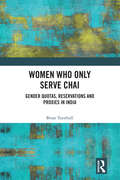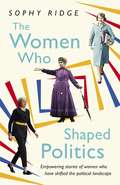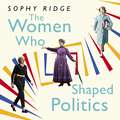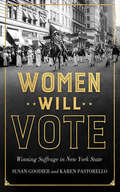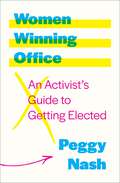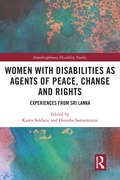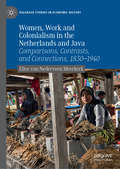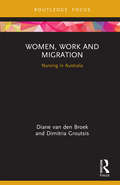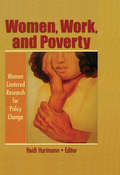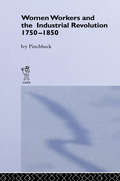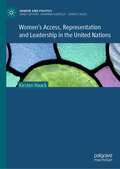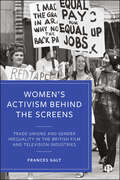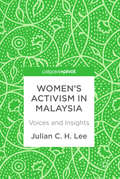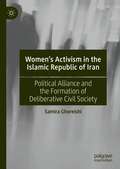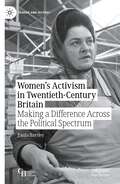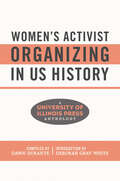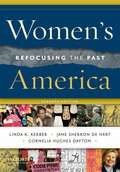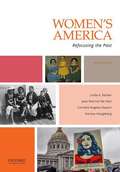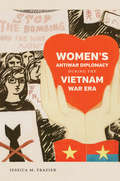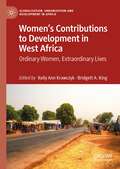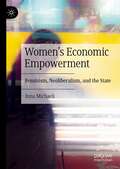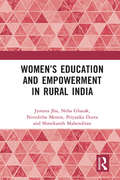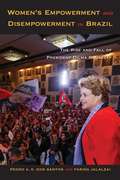- Table View
- List View
Women Who Only Serve Chai: Gender Quotas, Reservations and Proxies in India
by Brian TurnbullThis book investigates the experiences of women city councilors in India. It follows the careers of women in Jaipur, Rajasthan, who were brought into public office through a gender quota instituted over two decades ago. It reveals how, even in office, women continue to face stigma and normative restrictions imposed by a society not entirely willing to accept them in a public and independent position; and how men, technically blocked by the gender quota from holding office themselves, continue to exert control and influence over women officeholders, even sidelining them in many cases as proxies. The volume also documents the role of these men, colloquially known as parshad-patis, who have uniquely subverted the gender quota without violating any of the formal quota rules. To combat these challenges, the author presents pragmatic approaches to empower women in political offices at the grassroots and highlights the need for a comprehensive support structure to aid gender quota institutions in delivering equality in highly patriarchal environments. Drawing on extensive fieldwork and interviews with elected members and their spouses, as well as journalists, women’s rights activists, and student political leaders, this book provides fascinating insights into the everyday politics of India. It will be of great interest to scholars and researchers of gender studies, politics, political processes, and South Asian studies.
The Women Who Shaped Politics: Empowering stories of women who have shifted the political landscape
by Sophy RidgeSophy Ridge, presenter for Sky News, has uncovered the extraordinary stories of the women who have shaped British politics. Never has the role of women in the political world ever been more on the news agenda, and Sophy has interviewed current and former politicians including among others, Nicola Sturgeon, Ruth Davidson, Betty Boothroyd gain exclusive insight into the role women play in politics at the highest level. The book also includes Theresa May's first at-length interview about her journey to becoming Prime Minister. These interviews have revealed the shocking truth about the sexism that is rife among the House of Commons both in the past and today, with sometimes shocking, and sometimes amusing anecdotes revealing how women in Westminster have worked to counter the gender bias. Sophy provides gripping insight into historical and contemporary stories which will fascinate not just those interested in politics but those who want to know more about women's vital role in democracy. From royalty to writers and from class warriors to suffragettes, Sophy tells the story of those who put their lives on the line for equal rights, and those who were the first to set foot inside the chambers of power, bringing together stories that you may think you know, and stories that have recently been discovered to reveal the truth about what it is to be a woman in Westminster. Looking at the different ways that women have shaped government allows Sophy to draw parallels across history and celebrate fascinating women you want to know more about.
The Women Who Shaped Politics: Empowering stories of women who have shifted the political landscape
by Sophy RidgeSophy Ridge, presenter for Sky News, has uncovered the extraordinary stories of the women who have shaped British politics. Never has the role of women in the political world ever been more on the news agenda, and Sophy has interviewed current and former politicians including among others, Nicola Sturgeon, Ruth Davidson, Betty Boothroyd gain exclusive insight into the role women play in politics at the highest level. The book also includes Theresa May's first at-length interview about her journey to becoming Prime Minister. These interviews have revealed the shocking truth about the sexism that is rife among the House of Commons both in the past and today, with sometimes shocking, and sometimes amusing anecdotes revealing how women in Westminster have worked to counter the gender bias. Sophy provides gripping insight into historical and contemporary stories which will fascinate not just those interested in politics but those who want to know more about women's vital role in democracy. From royalty to writers and from class warriors to suffragettes, Sophy tells the story of those who put their lives on the line for equal rights, and those who were the first to set foot inside the chambers of power, bringing together stories that you may think you know, and stories that have recently been discovered to reveal the truth about what it is to be a woman in Westminster. This book is a celebration of the differing ways that women have shaped the political landscape. The book also, importantly, sheds light on the challenges faced by women in government today, telling us the ways that women working in politics battle the sexism that confront them on a daily basis.
The Women Who Shaped Politics: Empowering stories of women who have shifted the political landscape
by Sophy RidgeFrom royalty to suffragettes and from campaigners to contemporary rebels, Sky News Presenter Sophy Ridge explains the ways that women have changed the face of politics.Sophy Ridge, presenter for Sky News, has uncovered the extraordinary stories of the women who have shaped British politics. Never has the role of women in the political world ever been more on the news agenda, and Sophy has interviewed current and former MPs to gain exclusive insight into the role women play in politics at the highest level. The book also includes Theresa May's first at-length interview about her journey to becoming Prime Minister.Sophy provides gripping insight into historical and contemporary stories which will fascinate not just those interested in politics but those who want to know more about women's vital role in democracy. From royalty to writers and from class warriors to suffragettes, Sophy tells the story of those who put their lives on the line for equal rights, and those who were the first to set foot inside the chambers of power, bringing together stories that you may think you know, and stories that have recently been discovered. Looking at the different ways that women have shaped government allows her to draw parallels across history and uncover fascinating women you want to know more about.(P)2017 Hodder & Stoughton
Women Will Vote: Winning Suffrage in New York State
by Susan Goodier Karen PastorelloWomen Will Vote celebrates the 2017 centenary of women’s right to full suffrage in New York State. Susan Goodier and Karen Pastorello highlight the activism of rural, urban, African American, Jewish, immigrant, and European American women, as well as male suffragists, both upstate and downstate, that led to the positive outcome of the 1917 referendum. Goodier and Pastorello argue that the popular nature of the women’s suffrage movement in New York State and the resounding success of the referendum at the polls relaunched suffrage as a national issue. If women had failed to gain the vote in New York, Goodier and Pastorello claim, there is good reason to believe that the passage and ratification of the Nineteenth Amendment would have been delayed. Women Will Vote makes clear how actions of New York’s patchwork of suffrage advocates heralded a gigantic political, social, and legal shift in the United States. Readers will discover that although these groups did not always collaborate, by working in their own ways toward the goal of enfranchising women they essentially formed a coalition. Together, they created a diverse social and political movement that did not rely solely on the motivating force of white elites and a leadership based in New York City. Goodier and Pastorello convincingly argue that the agitation and organization that led to New York women’s victory in 1917 changed the course of American history.
Women Winning Office: An Activist’s Guide to Getting Elected
by Peggy NashWhen Peggy Nash first decided to run for elected office, she had no idea where to start, who to contact, or what the rules were. For those who are underrepresented in political life, politics can seem like a secret society designed to shut them out. Women Winning Office is a practical handbook for activist women on how to open doors and take their place in the political process. Find out how to build a team, get nominated, inspire volunteers, and canvass voters. Nash draws on her experience in five federal campaigns, as well as the stories of many inspiring Canadian women who have run for office at all levels of government. Some succeeded; some did not. Some faced difficult and painful experiences. Every one of them would do it again. To make real progressive change, we need to change not only who gets elected in Canada, but how our democracy functions. If you want to find out how to take your desire for a better world into elected office, this book is for you.
Women with Disabilities as Agents of Peace, Change and Rights: Experiences from Sri Lanka (Interdisciplinary Disability Studies)
by Karen Soldatic and Dinesha SamararatneDrawing on rich empirical work emerging from core conflict regions within the island nation of Sri Lanka, this book illustrates the critical role that women with disabilities play in post-armed conflict rebuilding and development. This pathbreaking book shows the critical role that women with disabilities play in post-armed conflict rebuilding and development. Through offering a rare yet important insight into the processes of gendered-disability advocacy activation within the post-conflict environment, it provides a unique counter narrative to the powerful images, symbols and discourses that too frequently perpetuate disabled women’s so-called need for paternalistic forms of care. Rather than being the mere recipients of aid and help, the narratives of women with disabilities reveal the generative praxis of social solidarity and cohesion, progressed via their nascent collective practices of gendered-disability advocacy. It will be of interest to academics and students working in the fields of disability studies, gender studies, post-conflict studies, peace studies and social work.
Women, Work and Colonialism in the Netherlands and Java: Comparisons, Contrasts, and Connections, 1830–1940 (Palgrave Studies in Economic History)
by Elise van Nederveen Meerkerk‘This book makes an important contribution to the history of household labour relations in two contrasting societies. It deserves a wide readership.’—Anne Booth, SOAS University of London, UK ‘By exploring how colonialism affected women’s work in the Dutch Empire this carefully researched book urges us to rethink the momentous implications of colonial exploitation on gender roles both in periphery and metropolis.’ —Ulbe Bosma, the Free University of Amsterdam, the Netherlands ‘In this exciting and original book, Elise van Nederveen Meerkerk exposes how colonial connections helped determine the status and position of women in both the Netherlands and Java. The effects of these connections continue to shape women’s lives in both colony and metropole today.’—Jane Humphries, University of Oxford, UKRecent postcolonial studies have stressed the importance of the mutual influences of colonialism on both colony and metropole. This book studies such colonial entanglements and their effects by focusing on developments in household labour in the Dutch Empire in the period 1830-1940. The changing role of households’, and particularly women’s, economic activities in the Netherlands and Java, one of the most important Dutch colonies, forms an excellent case study to help understand the connections and disparities between colony and metropole.The author contends that colonial entanglements certainly existed, and influenced developments in women’s economic role to an extent, both in Java and the Netherlands. However, during the nineteenth century, more and more distinctions in the visions and policies towards Dutch working class and Javanese peasant households emerged. Accordingly, a more sophisticated framework is needed to explain how and why such connections were – both intentionally and unintentionally – severed over time.
Women, Work and Migration: Nursing in Australia (Routledge Focus on Business and Management)
by Diane van den Broek Dimitria GroutsisThis book looks at the migration and work experiences of six women who have migrated to Australia from China; Zimbabwe; South Korea; the United Kingdom; India and the Philippines. It sets their journeys out into three distinct periods of migration, including the first period of their lives when they reflect on their experiences growing up with their immediate families and the factors that encouraged them to gravitate towards a nursing career. The second period covers time when each of these women begin to think about where their career in nursing might taken them. During this phase, these women take their first steps to leave their home country and migrate to Australia, often after several countries in between. The final section allows the reader to understand how these women initially experienced Australia when they first arrived and how they faced challenges both personally and professionally after arrival in their new place to call home. The discussions within these three sections cover both professional and personal/familial reflections, where differences in nursing identity between sending and destination country is discussed alongside the adjustments that the women needed to make to overcome loneliness and to successfully integrate into new organizational environments. Each chapter analyses migration as a life course, which considers why nurses leave their home country and find a new place to call home. Furthermore, if they find themselves thinking about returning to their country of birth; how or if they maintain transnational links, and how identity and ethnicity shape these responses. These life trajectories are underscored by an historical context setting of nursing migration to Australia in the opening chapter offering unique insights into the changing process of migration, accreditation, registration and settlement of nurses in Australia. The book will be of value to researchers, academics, and students interested in gender studies, career and migration, health and nursing, and international HRM.
Women, Work, and Poverty: Women Centered Research for Policy Change
by Heidi I. HartmannFind out how welfare reform has affected women living at the poverty levelWomen, Work, and Poverty presents the latest information on women living at or below the poverty level and the changes that need to be made in public policy to allow them to rise above their economic hardships. Using a wide range of research methods, including in-depth interviews, focus groups, small-scale surveys, and analysis of personnel records, the book explores different aspects of women&’s poverty since the passage of the 1986 welfare reform bill. Anthropologists, economists, political scientists, sociologists, and social workers examine marriage, divorce, children and child care, employment and work schedules, disabilities, mental health, and education, and look at income support programs, such as welfare and unemployment insurance. Women, Work, and Poverty illuminates the changes in the causes of women&’s poverty following welfare reform in the United States, using up-to-date research that&’s both qualitative and quantitative. Taking racial and ethnic diversity into account, the book&’s contributors examine new findings on the feminization of poverty, the role of children and the lack of child care as an obstacle to employment, labor market policies that can reduce poverty and improve gender wage equality, sex and race segregation in the labor market, and the low quality of jobs available to low income women.Women, Work, and Poverty examines: marriage, motherhood, and work pay equity and living wage reforms community resources welfare status and child care acquiring higher education advancing women of color income security repaying debt after divorce gender differences in spendable income women&’s job lossWomen, Work, and Poverty is an invaluable aid for academics working in social work, social policy, women&’s studies, economics, sociology, and political science, and for policy researchers, anti-poverty activists, and women&’s leaders.
Women Workers in the Industrial Revolution
by Ivy PinchbeckFirst Published in 2004. It is often assumed that the woman worker was produced by the Industrial Revolution, and that since that time women have taken an increasing share in the world's work. This theory is, however, quite unsupported by facts. In every industrial system in the past women have been engaged in productive work and their contribution has been recognised as an indispensable factor. This volume is devoted to women's employment inagriculture and the agrarian revolution.
Women's Access, Representation and Leadership in the United Nations (Gender and Politics)
by Kirsten HaackThe face of international politics has changed significantly in the 21st century: it has become increasingly female. Whether that includes women in multilateral meetings, global conferences and embassies, or women at the UN and one of its many agencies in the field, it is apparent that women are accessing leadership positions in a variety of areas. This book investigates the development of gender equality at the United Nations by analyzing women in leadership roles. This introduction of empirical feminism to the study of international organizations applies what is known about women’s participation and representation in comparative politics and gender studies to the United Nations System. It traces women’s access to leadership roles, and explains where and why a range of hurdles prevent women from participating in the work of the UN. In doing so, it offers insights into recruitment and human resources practices and their politics, and into leadership by bureaucratic actors.
Women’s Activism Behind the Screens: Trade Unions and Gender Inequality in the British Film and Television Industries
by Frances GaltFrances C. Galt explores the role of trade unions and women’s activism in the British film and television industries in this important contribution to debates around gender inequality. The book traces the influence of the union for technicians and other behind-the-camera workers and examines the relationship between gender and class in the labour movement. Drawing on previously unseen archival material and oral history interviews with activists, it casts new light on women’s experiences of union participation and feminism over nine decades. As concerns about the gender pay gap, women’s rights and harassment continue, it assesses historical progress and points the way to further change in film and TV.
Women’s Activism in Malaysia: Voices And Insights
by Julian C. LeeIn this book, the author draws on over a decade of first-hand experience as an academic-activist and on interviews with women in Malaysia’s women’s rights movement. Despite a considerable array of challenges to their participation in the public and political spheres, the movement is especially vibrant. Presenting insights from feminist activists in Malaysia, the book explores the Women’s Candidacy Initiative’s efforts to promote independent women in Parliament; the work of women’s coalition the Joint Action Group for Gender Equality; how activists understand and experience the concept of feminism; and finally the place of men in feminism. Women’s Activism in Malaysia will be of interest to students and scholars across a range of disciplines including gender studies, politics and sociology.
Women’s Activism in the Islamic Republic of Iran: Political Alliance and the Formation of Deliberative Civil Society
by Samira GhoreishiThrough an intersectional feminist re-reading of the Habermasian theoretical framework, this book analyses how women's activism has developed and operated in the Islamic Republic of Iran. Chapters look at three key areas of women's activism in Iran: how women deliberately engaged with media activism despite the government's controlling and repressive policies; women's involvement in civil society organisations, institutions and communities, and cooperation through multilevel activism; and women's activism in the political sphere and its connection with media and civil society activism despite the theocratic system. Drawing upon interviews, analyses of journal and newspaper articles and documentary/non-documentary films, as well as personal experiences, observations and communications, the book examines to what extent Iranian women's rights' groups and activists have collaborated not only with each other but with other social groups and activists to help facilitate the formation of a pluralist civil society capable of engaging in deliberative processes of democratic reform.This book will be of interest to scholars in Gender Studies and Middle Eastern Studies, particularly those who study women's and other social movements in Iran.
Women’s Activism in Twentieth-Century Britain: Making a Difference Across the Political Spectrum (Gender and History)
by Paula BartleyThis book serves as an introduction to the extraordinary diversity of women’s activism. Paula Bartley's original research is supported by a range of writing to provide a powerful impression of the actions taken by groups of women from across the social and political spectrum, making the book invaluable to both students and interested readers. These women set out to make a difference to their locality, their country and sometimes the world. The story of women’s activism embodies stimulating accounts of progress and reversals, of commitment and uncertainty, of competing rights and challenging wrongs. The story of women’s activism is not tidy or well-ordered. It is messy and unorthodox. And full of surprises.
Women's Activist Organizing in US History: A University of Illinois Press Anthology (Women, Gender, and Sexuality in American History)
by Dawn Durante Daina Berry Melinda Chateauvert Tiffany Gill Nancy A Hewitt Treva B. Lindsey Anne Firor Scott Charissa J. Threat Anne M. Valk Lara Vapnek Deborah Gray WhiteWomen in the United States organized around their own sense of a distinct set of needs, skills, and concerns. And just as significant as women's acting on their own behalf was the fact that race, class, sexuality, and ethnicity shaped their strategies and methods. This authoritative anthology presents some of the powerful work and ideas about activism published in the acclaimed series Women, Gender, and Sexuality in American History. Assembled to commemorate the series' thirty-fifth anniversary, the collection looks at two hundred years of labor, activist, legal, political, and community organizing by women against racism, misogyny, white supremacy, and inequality. The authors confront how the multiple identities of an organization's members presented challenging dilemmas and share the histories of how women created change by working against inequitable social and structural systems. Insightful and provocative, Women’s Activist Organizing in US History draws on both classic texts and recent bestsellers to reveal the breadth of activism by women in the United States in the nineteenth and twentieth centuries. Contributors: Daina Ramey Berry, Melinda Chateauvert, Tiffany M. Gill, Nancy A. Hewitt, Treva B. Lindsey, Anne Firor Scott, Charissa J. Threat, Anne M. Valk, Lara Vapnek, and Deborah Gray White
Women's America: Refocusing The Past
by Jane Sherron De Hart Cornelia H. Dayton Linda K. KerberFeaturing a mix of primary source documents, articles, and illustrations, Women's America: Refocusing the Past has long been an invaluable resource. It provides selections from leading theorists and historians that offer more material on the impact of ethnicity in American culture, the roles that women have played in the creation of male-dominated structures, and the international dimensions of women's lives.
Women's America: Refocusing The Past
by Linda K. Kerber Cornelia Hughes Dayton Karissa Haugeberg Jane Sherron De HartFeaturing a streamlined single-volume format, Women's America: Refocusing the Past is more teachable, accessible, and affordable than ever before. The ninth edition incorporates insights from new coeditor Karissa Haugeberg and appears at a time of anxiety about the meaning of equality in the twenty-first century. Some of the inequalities with which women have long struggled have been eliminated, while others have emerged or reemerged. Coinciding with the 100th anniversary of the passage of the 19th Amendment, Women's America is an indispensable text for the study of US women's history.
Women's Antiwar Diplomacy during the Vietnam War Era (Gender and American Culture)
by Jessica M. FrazierIn 1965, fed up with President Lyndon Johnson's refusal to make serious diplomatic efforts to end the Vietnam War, a group of female American peace activists decided to take matters into their own hands by meeting with Vietnamese women to discuss how to end U.S. intervention. While other attempts at women's international cooperation and transnational feminism have led to cultural imperialism or imposition of American ways on others, Jessica M.Frazier reveals an instance when American women crossed geopolitical boundaries to criticize American Cold War culture, not promote it. The American women Frazier studies not only solicited Vietnamese women's opinions and advice on how to end the war but also viewed them as paragons of a new womanhood by which American women could rework their ideas of gender, revolution, and social justice during an era of reinvigorated feminist agitation.Unlike the many histories of the Vietnam War that end with an explanation of why the memory of the war still divides U.S. society, by focusing on linkages across national boundaries, Frazier illuminates a significant moment in history when women formed effective transnational relationships on genuinely cooperative terms.
Women’s Contributions to Development in West Africa: Ordinary Women, Extraordinary Lives (Globalization, Urbanization and Development in Africa)
by Kelly Ann Krawczyk Bridgett A. KingThis book examines women’s participation in social, economic and political development in West Africa. The book looks at women from the premise of being active agents in the development processes within their communities, thereby subverting the dominate narrative of women as passive recipients of development.
Women's Economic Empowerment: Feminism, Neoliberalism, and the State
by Inna MichaeliChallenging the simplistic story by which feminism has become complicit in neoliberalism, this book traces the course of globalization of women’s economic empowerment from the Global South to the Global North and critically examines the practice of empowering low-income women, primarily migrant, indigenous and racialised women. The author argues that women’s economic empowerment organizations become embedded in the neoliberal re-organization of relations between civil society, state and market, and in the reconfiguration of relations between the personal and the political. Also examined are the contractual nature of institutional arrangements in neoliberalism, the ontological divide between economy and society, and the marginalisation of feminist economics that persists in the field of women’s economic empowerment. The book will be of interest to scholars and students of social sciences, gender studies, sociology, and economics. This book is based on the author’s doctoral dissertation at the Humboldt University of Berlin, Faculty of Humanities and Social Sciences.
Women’s Education and Empowerment in Rural India
by Jyotsna Jha Neha Ghatak Niveditha Menon Priyanka Dutta Shreekanth MahendiranThis is a book about understanding women’s empowerment and pathways as well as roadblocks to women’s economic empowerment in rural India, as understood through an evaluation-based research of a state-funded social sector programme located in the education department – Mahila Samakhya (MS) – in Bihar, one of the socially and educationally most underdeveloped Indian states. The book presents findings of the three-year research that adopted a mixed-methods approach and evaluated the impact of MS on various facets of empowerment of women coming from the most marginalized communities. The study, therefore, tries to go beyond evaluating the MS programme and uses the research findings and insights to raise certain critical issues pertaining to social policy planning and implementation, especially in the context of women’s education and empowerment. Please note: Taylor & Francis does not sell or distribute the Hardback in India, Pakistan, Nepal, Bhutan, Bangladesh and Sri Lanka
Women's Empowerment and Disempowerment in Brazil: The Rise and Fall of President Dilma Rousseff
by Pedro A. dos Santos Farida JalalzaiIn 2010, Dilma Rousseff was the first woman to be elected President in Brazil. She was re-elected in 2014 before being impeached in 2016 for breaking budget laws. Her popularity and controversy both energized and polarized the country. In Women’s Empowerment and Disempowerment in Brazil, dos Santos and Jalalzai examine Rousseff’s presidency and what it means for a woman to hold (and lose) the country’s highest power. The authors examine the ways Rousseff exercised dominant authority and enhanced women’s political empowerment. They also investigate the extent her gender played a role in the events of her presidency, including the political and economic crises and her ensuing impeachment. Emphasizing women’s political empowerment rather than representation, the authors assess the effects of women executives to more directly impact female constituencies—how they can empower women by appointing them to government positions; make policies that advance women’s equality; and, through visibility, create greater support for female politicians despite rampant sexism. Women’s Empowerment and Disempowerment in Brazil uses Rousseff’s presidency as a case study to focus on the ways she succeeded and failed in using her authority to empower women. The authors’ findings have implications throughout the world.
Women's Empowerment and Disempowerment in Brazil: The Rise and Fall of President Dilma Rousseff
by Pedro A. dos Santos Farida JalalzaiIn 2010, Dilma Rousseff was the first woman to be elected President in Brazil. She was re-elected in 2014 before being impeached in 2016 for breaking budget laws. Her popularity and controversy both energized and polarized the country. In Women’s Empowerment and Disempowerment in Brazil, dos Santos and Jalalzai examine Rousseff’s presidency and what it means for a woman to hold (and lose) the country’s highest power. The authors examine the ways Rousseff exercised dominant authority and enhanced women’s political empowerment. They also investigate the extent her gender played a role in the events of her presidency, including the political and economic crises and her ensuing impeachment. Emphasizing women’s political empowerment rather than representation, the authors assess the effects of women executives to more directly impact female constituencies—how they can empower women by appointing them to government positions; make policies that advance women’s equality; and, through visibility, create greater support for female politicians despite rampant sexism. Women’s Empowerment and Disempowerment in Brazil uses Rousseff’s presidency as a case study to focus on the ways she succeeded and failed in using her authority to empower women. The authors’ findings have implications throughout the world.
